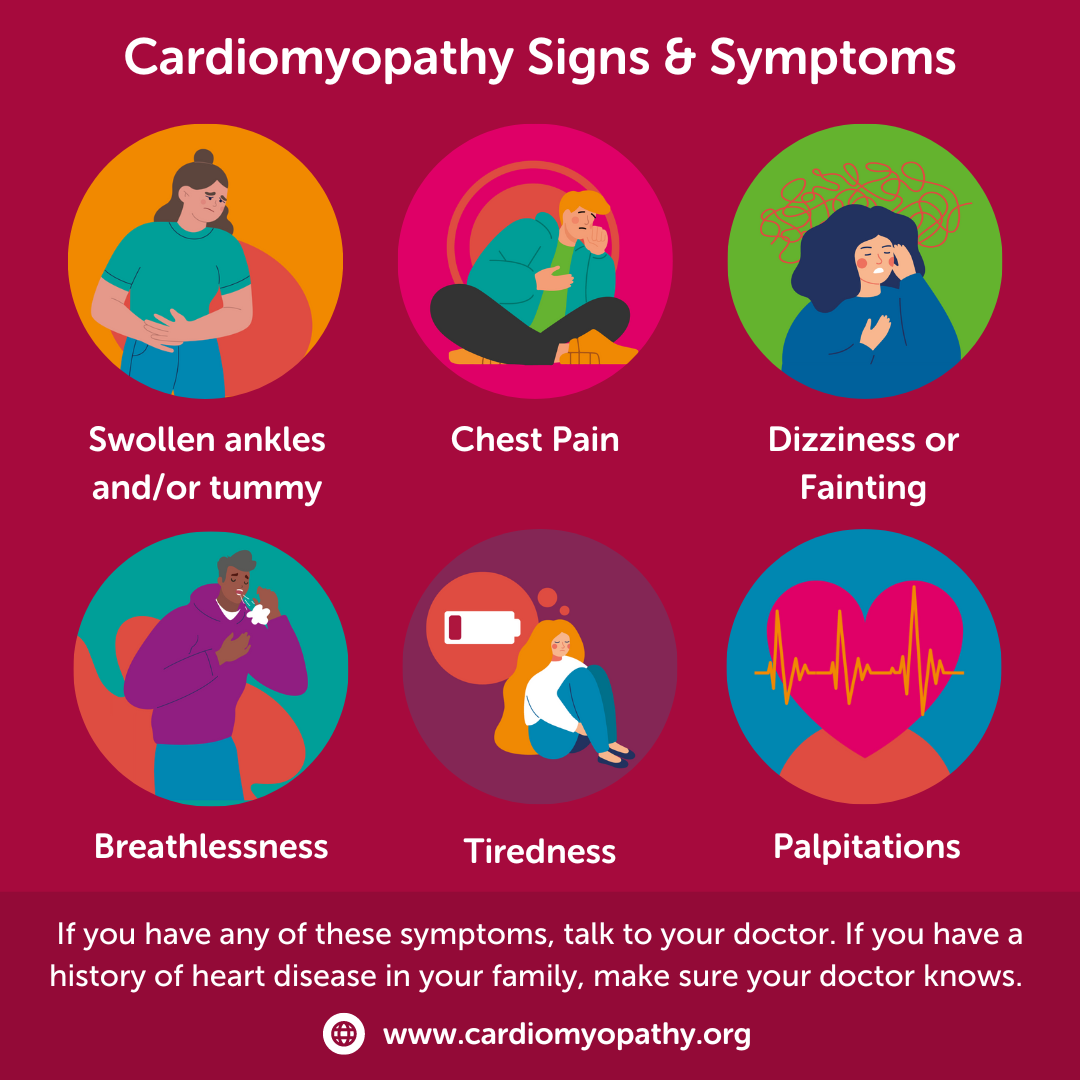Cardiomyopathy can cause the following symptoms:
Breathlessness: fluid builds up on the lungs, making it harder to breathe.
Tiredness: if the heart's function is reduced, less energy is delivered to the tissues, which can cause fatigue or tiredness.
Swollen ankles and/or tummy: if the heart can't pump effectively, fluid can build up in the tissues. This causes swelling (also known as oedema).
Palpitations: (feeling your heart beating) can be caused by abnormal heart rhythms. These are known as arrhythmias.
Dizziness or fainting: when you're heart isn't working effectively, your oxygen levels are reduced, causing light-headedness, dizziness and, in some cases, fainting.
Chest pain: chest pain can be caused by reduced blood flow from the heart.
Someone with cardiomyopathy may not have all of the symptoms listed here, as the symptoms can vary for each person.

Symptoms in babies and children
Children may express symptoms in a slightly different way:
Breathlessness: babies may have an increased rate of breaths, nostrils may widen whilst breathing, part of the chest may be seen to be 'drawn in' and they may have a possible blue tinge to the lips and mouth.
Tiredness: babies and toddlers may not wake up for feed, they may feed less often and they may sleep for longer or more often than usual.
Chest pain: young children may describe chest pain and/or palpitations as 'tummy ache'
If you have symptoms
If you are experiencing symptoms make an appointment to see your GP.
Keep a record of what symptoms you have and have your notes to hand when you speak to your doctor. You can use our symptoms diary to keep a record of your symptoms
To request a symptoms diary, email contact@cardiomyopathy.org
These six symptoms can also be symptoms of other types of heart conditions, so if you’re experiencing them, it doesn’t necessarily mean that you have cardiomyopathy. However, it is important to get checked by a doctor if you are concerned, particularly if you find that your symptoms change or get worse.
Know your family heart history
Cardiomyopathy can have a number of different causes depending on the type of cardiomyopathy. However, in many cases it is a genetic condition that can be passed down through families so it’s important to know of any family history of heart disease or sudden, unexplained death.
If you think you might have a history of heart disease or sudden, unexplained death in your family, speak to your family about it.
Make sure that your GP knows about any history of heart disease of sudden unexplained death in your family. You can phone your GP and ask them to add this information to your medical record. Alternatively, next time you see your GP, whether it is about your heart or something else, let them know about your family heart history and they will add the information to your medical records. Find out more about cardiomyopathy and genetics >
Other ways to monitor your health
There are a variety of tools for monitoring your symptoms and managing your health condition which can be shared with your health care team.
These include:
Kardia Mobile from AliveCor - A device which can measure medical information, including ECGs, via an Apple or Android smartphone.
OMRON Complete blood pressure and ECG monitor - An accurate and easy to use blood pressure monitor with ECG recording. This monitor records measurements and tracks data.
Apple products - Apple also have a selection of smart watches that are able to monitor a variety of health insights.
Raise awareness of the symptoms
Download our shareable symptoms resources to raise awareness of cardiomyopathy. Raising awareness could save a life.
